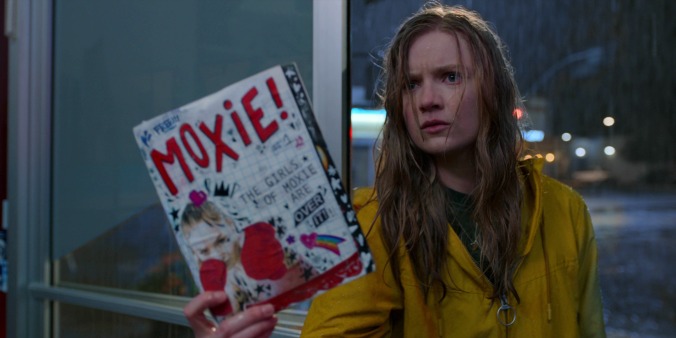The revolution is in Mom’s zine collection in Amy Poehler’s riot grrrl nostalgia trip Moxie


On its 2000 album All Hands On The Bad One, Sleater-Kinney bemoans the co-opting of the riot grrrl movement by mass media: “I’m spending all my days at girlpower.com / Trying to buy back a little piece of me,” Corin Tucker, a “bearer of the flag since the beginning,” sings on “#1 Must Have.” Considering that this was the deflating end point of ’90s punk feminism, it’s difficult to decide what to make of Moxie. Is this more of that watered-down bubblegum that so disillusioned the original grrrls? Or is it something more innocent, and yet somehow more distressing: proof that those of us who remember these bands from the first time around are now officially old?
In Moxie, Vivian (Hadley Robinson), a high school junior in suburban Oregon, creates an anonymous, handmade publication railing against the sexism at her school. Her inspiration? Brace yourself, Gen-Xers and old millennials, it’s her mom’s zine collection. Amy Poehler, who also directs (this is her second feature, after Wine Country), plays the mom, Lisa, a former Portland scenester who’s since settled into a life of home ownership and long hours at work. She still keeps the rebellious flame alive, however, if only in a suitcase full of mementos and a leather jacket that hangs in her office closet. An offhand comment from Lisa about wanting to “[burn] down the patriarchy” in her teenage years leads Vivian to rifle through that suitcase, a fateful act that eventually spirals into an insurrection at her high school.
Moxie is based on a young-adult novel by Jennifer Mathieu, which accounts for the multiple storylines bogging down its two-hour runtime. (Interestingly, the novel is set in Texas, a more likely home for the “boys will be boys” attitude that sparks Vivian’s rage than the Pacific Northwest.) While tracing the aftermath of Vivian surreptitiously dropping a pile of zines in the girls’ bathroom, Moxie also follows Vivian’s friendship with her BFF, Claudia (Lauren Tsai), and rebellious new girl at school Lucy (Alycia Pascual-Pena). There’s also a sweet teen love story that elevates Nico Hiraga, a.k.a. the skater kid from Booksmart, to a romantic lead. On their first date, Vivian and his character, Seth, break into a funeral home and snuggle in a coffin listening to Bikini Kill through a pair of shared earbuds—an alt-teenager’s dream, then and now.
But although Kathleen Hanna and company—specifically, their most famous song, “Rebel Girl”—play a prominent role in the narrative, and the set design is littered with vintage riot grrrl signifiers like Sleater-Kinney T-shirts and Huggy Bear posters, Moxie seems designed for the same Gen Z audience as Olivia Wilde’s 2019 film. Designed for, not created by, mind you: Moxie has the air of a hipster parent playing their record collection for an indifferent adolescent, asking, “Doesn’t this slap?” It tries, but the dialogue in the film is cringeworthy, particularly when it incorporates AAVE slang. (It’s smart enough not to put “Get the bag, sis” or “That’s fire” in the mouths of its white characters, to be fair.) Learning from the mistakes of the riot grrrl movement, Moxie does incorporate intersectionality into its feminism—in fact, one of the film’s most valuable messages is that the best thing an ally can do is step aside and let marginalized people speak for themselves. But you can still tell a couple well-meaning white ladies wrote the script.
There are worse fates than dorky earnestness, of course. But Moxie just isn’t all that funny either. (This is coming from someone who found Booksmart pretty hilarious, so adjust your expectations accordingly.) The teenage girls in the audience may warm to discussions about the sidelining of the girls’ soccer team in favor of boys’ football or the unfairness of school dress codes that make girls responsible for boys’ behavior. But the lack of any distinct visual identity for the film only highlights the corniness of the dialogue. And while a dramatic Hail Mary toward the end does wrap up the story, introducing the most serious issue yet—an anonymous rape allegation—in the last 20 minutes of a nearly two-hour film makes it seem like an afterthought.
Moxie isn’t a total wash. The young cast is energetic and engaged with the material, even when they’re reciting mouthfuls like “the end of the mediocre white dude’s chokehold on success.” Speaking of, Patrick Schwarzenegger is perfectly cast as the leering face of said mediocrity, although his comeuppance is too abrupt to be truly satisfying. It’ll probably be a while before we start getting films about the Gen Z experience made by members of that generation, at least in the realm of studio filmmaking. But while this old lady can’t say for sure whether today’s teens will find Moxie inspiring or eye-rolling, it is nice to see a film that acknowledges that becoming politically conscious is an ongoing process. Even if it’s a mom who’s saying it.